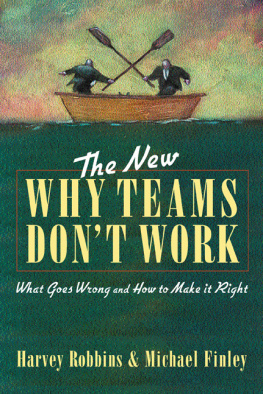Michael P. Letsky - Macrocognition in Teams
Here you can read online Michael P. Letsky - Macrocognition in Teams full text of the book (entire story) in english for free. Download pdf and epub, get meaning, cover and reviews about this ebook. year: 2008, publisher: Ashgate, genre: Romance novel. Description of the work, (preface) as well as reviews are available. Best literature library LitArk.com created for fans of good reading and offers a wide selection of genres:
Romance novel
Science fiction
Adventure
Detective
Science
History
Home and family
Prose
Art
Politics
Computer
Non-fiction
Religion
Business
Children
Humor
Choose a favorite category and find really read worthwhile books. Enjoy immersion in the world of imagination, feel the emotions of the characters or learn something new for yourself, make an fascinating discovery.

- Book:Macrocognition in Teams
- Author:
- Publisher:Ashgate
- Genre:
- Year:2008
- Rating:3 / 5
- Favourites:Add to favourites
- Your mark:
- 60
- 1
- 2
- 3
- 4
- 5
Macrocognition in Teams: summary, description and annotation
We offer to read an annotation, description, summary or preface (depends on what the author of the book "Macrocognition in Teams" wrote himself). If you haven't found the necessary information about the book — write in the comments, we will try to find it.
Macrocognition in Teams — read online for free the complete book (whole text) full work
Below is the text of the book, divided by pages. System saving the place of the last page read, allows you to conveniently read the book "Macrocognition in Teams" online for free, without having to search again every time where you left off. Put a bookmark, and you can go to the page where you finished reading at any time.
Font size:
Interval:
Bookmark:
MACROCOGNITION IN TEAMS
Theories and Methodologies
Edited by
MICHAEL P. LETSKY
Office of Naval Research, Arlington, USA,
NORMAN W. WARNER
Naval Air Systems Command, USA
STEPHEN M. FIORE
University of Central Florida, USA
C.A.P. SMITH
Colorado State University, USA
ASHGATE
Michael P. Letsky, Norman W. Warner, Stephen M. Fiore and C.A.P. Smith, 2008
All rights reserved. No part of this publication may be reproduced, stored in a retrieval system or transmitted in any form or by any means, electronic, mechanical, photocopying, recording or otherwise without the prior permission of the publisher.
Michael P. Letsky, Norman W. Warner, Stephen M. Fiore and C.A.P. Smith have asserted their moral rights under the Copyright, Designs and Patents Act, 1988, to be identified as the editors of this work.
Published by
Ashgate Publishing Limited
Gower House
Croft Road
Aldershot
Hampshire GU11 3HR
England
Ashgate Publishing Company
Suite 420
101 Cherry Street
Burlington, VT 05401-4405
USA
www.ashgate.com
British Library Cataloguing in Publication Data
Macrocognition in teams : theories and methodologies.
(Human factors in defence)
1. Teams in the workplace 2. Cognition
I. Letsky, Michael P.
658.4022
ISBN: 978-0-7546-7325-5
ISBN: 978-1-4094-8577-3 (ebk-ePUB)
Library of Congress Cataloging-in-Publication Data
Macrocognition in teams : theories and methodologies / by Michael P. Letsky ... [et al.].
p. cm. -- (Human factors in defence)
Includes bibliographical references and index.
ISBN 978-0-7546-7325-5
1. Teams in the workplace. 2. Cognition. I. Letsky, Michael P.
HD66.M335 2008
658.4022--dc22
2008005948

Printed and bound in Great Britain by MPG Book Ltd, Bodmin, Cornwall.
Table 14.1 Collaborative critical thinking behaviors defined
and applied to two objects of analysis: team products and team process
This volume is about the study of high-level cognitive processing in teamwork. It represents the first forum upon which we hope the science of macrocognition will grow and prosper. We hope this volume motivates a deeper and richer dialogue amongst those interested in team performance in one-of-a-kind scenarios. Although the topic addressed here is focused on the study of high-level mental processing in complex problem-solving teams, the research products have the potential to be a major factor in our evolution toward global and international problem resolution. More specifically, the domain this volume considers includes teams engaging in brainstorming, decision-making, intelligence analysis, disaster relief, mission planning and many other activities that share the properties of short-fused, high stakes, one-of-a-kind, complex problem-solving. Such teams also often include multidisciplinary or multicultural members, uncertainty of source information and participants that are often geographically distributed and engaging in teamwork asynchronously. These characteristics broadly define the domain of interest considered here.
The evolving military strategy of Defense Transformation dictates the use of small, autonomous, quick-response teams rather than use of massive forces with large weapons platforms. So too, the commercial world seems to be wrestling with these same issues as geometrically advancing sociotechnical systems produce floods of data and international partnerships create challenges in the rapid transfer of knowledge. Teams that work in this environment will need different sets of tools and new capabilities that might be described as advanced knowledge processing and the ability to rapidly exchange meaning among distributed team members.
In this book we have focused upon macrocognition as the term descriptive of the cognitive processes to be studied. The term has been used previously to describe the study of cognition in real-to-life situations, but here we expand the concept through a reductionism approach that proposes that these fundamental concepts can be studied both in a laboratory environment and in the field setting, with the results being extensible for use in other applications. A more detailed definition of macrocognition and a conceptual model is offered in the introductory chapter. The purpose of this preliminary model is to serve as a conceptual framework to understand macrocognition in teams along with focusing research efforts. Since the study of macrocognition is truly interdisciplinary including contributions from psychology, philosophy, computer science, mathematics and business management many of the terms used that have the same label have different meanings across the contributing disciplines. This has been a significant problem both in terms of communication of findings as well as determining where best to publish the research findings. To date the psychology literature base has been the main target of publications generated to provide a contextual reference for non-sequential topics throughout the text.
As previously mentioned, macrocognition is one component that comprises team performance. For the purpose of defining our scope of effort, we recognize that training, human behavior, team formation, expertise and many other factors contribute to team performance. However, for study of our central topic these factors are assumed to be held constant. It is also recognized that many enabling technologies contribute to team performance including sociotechnical systems, human factors in design issues and human performance modeling of perception, attention and reaction. These technologies are regarded as necessary and supporting tools in the study of team performance but are not considered as an area to be examined within the scope of this text.
The topic of study described herein had its inception in the fall of 1999 with the establishment of the Collaboration and Knowledge Interoperability Program at the Office of Naval Research. The nature of the program is Discovery and Invention, ONRs term for fundamental research. The program is supplemented by Small Business Innovative Research (SBIR) projects which serve as a source of funding for applications work. A Multidisciplinary University Research Initiative (MURI) project was started in 2005, adding a significant additional increment of basic research effort. The structure and strategy of the CKI program was initiated then from these funding sources in the form of a basic research investment, supplemented by two testbeds for technology demonstration purposes and a series of applications projects to develop tools to support team problem-solving and decision-making. The structure of this volume also follows from this alignment of projects. The first section reports on the contributions of research grants, both at various universities and Navy labs. The second section reports the results of the various applications (SBIR) projects that are part of the program and the final section discusses the structure and employment of the two research product testbeds that are part of the program.
In summary, this book is intended to serve both academic and applications interests. Products could be employed in both military and commercial settings as is the objectives of the SBIR projects. The contribution of this volume and the program is aimed at improving team performance, specifically quick response,
Next pageFont size:
Interval:
Bookmark:
Similar books «Macrocognition in Teams»
Look at similar books to Macrocognition in Teams. We have selected literature similar in name and meaning in the hope of providing readers with more options to find new, interesting, not yet read works.
Discussion, reviews of the book Macrocognition in Teams and just readers' own opinions. Leave your comments, write what you think about the work, its meaning or the main characters. Specify what exactly you liked and what you didn't like, and why you think so.







